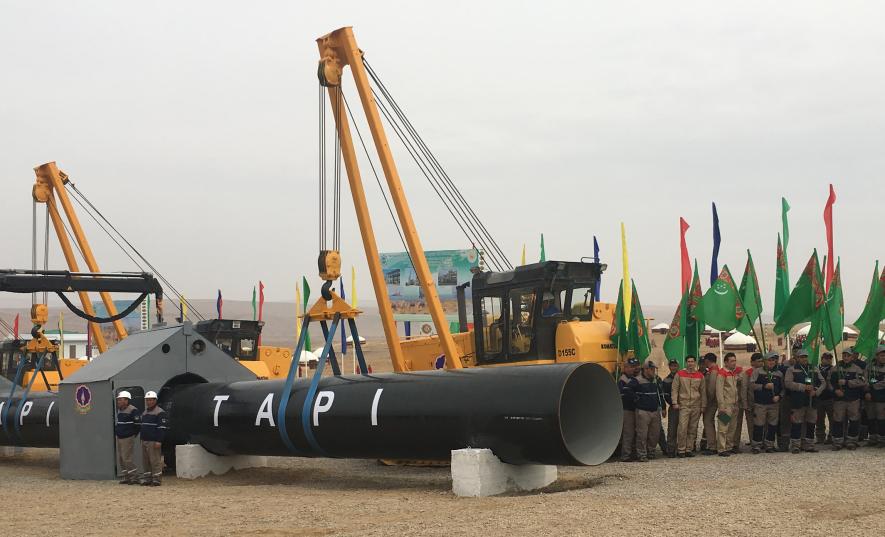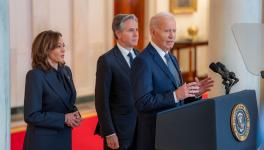Will Taliban Rule in Afghanistan Boost TAPI Project, Help India?

Representational image. | Image Courtesy: Wikipedia
The recent Taliban takeover of Afghanistan may revive hopes for progress in the construction of the TAPI (Turkmenistan-Afghanistan-Pakistan-India) gas pipeline that could ultimately benefit India. However, it has to be seen how New Delhi reacts to the Afghan developments and deals with the new regime in Kabul.
The TAPI pipeline will span over 1,800 kilometres from the Turkmenistan-Afghanistan border to the Pakistan-India border. When the pipeline is at its full capacity, it is estimated to transport 33 billion cubic meters of natural gas each year from the Caspian Sea to Afghanistan, Pakistan and India. The project has so far been fully completed inside Turkmenistan, but large swathes of land remain where pipes have to be laid, for which the cooperation of the Taliban is essential.
Despite long delays primarily due to the situation in Afghanistan, none of the stakeholders has abandoned the project since the ground-breaking ceremony in Turkmenistan in 2015 and the inauguration of the Afghan leg of the project in 2018.
US OIL INTERESTS AND TALIBAN
Besides being currently in power, historically, the Taliban has got a lot to do with this pipeline project.
Let’s go back a few decades. TAPI was essentially conceived in the early 1990s by the United States and its oil majors, particularly the UNOCAL or the Union Oil Company of California, to bypass both Iran and Russia and sell gas to needy nations like Afghanistan, Pakistan and India. (UNOCAL was taken over by another US major Chevron in August 2005.)
Various news reports have said that the Bush family and Bush administration had a long-standing association with oil and gas cartels through their Texas links, including with the UNOCAL. While George Bush (Senior) had links with the Carlyle Group which specialized in global oil investments, Dick Cheney (who later became the Vice President of the United States) was a senior employee of Haliburton that had major interests in the construction of oil and gas pipelines. Condoleezza Rice worked for Chevron before becoming the US National Security Advisor, these reports said.
Zalmay Khalilzad, who was the special US envoy on Afghanistan, had signed the 2020 agreement with Taliban’s Mullah Baradar in Doha on behalf of the US government, following which the US troop withdrawal took place. Khalilzad was earlier a Chief Consultant (risk assessor) for UNOCAL and had served as the Special Representative for Afghanistan Reconciliation at the US State Department and later became the American envoy to the United Nations. Even former Afghan President Hamid Karzai was alleged to have worked for UNOCAL, but both he and the company have denied the charge.
EARLIER NEGOTIATIONS WITH TALIBAN
When the pipeline idea was first mooted, it was to have reached up to Multan in Pakistan. But UNOCAL and other backers of the project wanted it to reach India, a large gas market for them. UNOCAL attempted to secure the deal with the Taliban, which had seized control of the Afghan capital, Kabul, after a devastating civil war in 1997-98. It was the United States' first attempt to forge a partnership with the fundamentalist Taliban regime, which was not recognized by the international community at that time, according to the former diplomat, G Parthasarathy.
UNOCAL even flew senior Taliban members to Texas in 1997 in an attempt to come to an agreement. Khalilzad, who had served as a State Department official when Ronald Reagan was president, worked as a consultant for the now-defunct company. Khalilzad met the Taliban members in the city of Houston and publicly voiced support for the radical Islamists at the time. The "Taliban does not practise the anti-U.S. style of fundamentalism practised by Iran -- it is closer to the Saudi model," Khalilzad wrote in a 1996 op-ed for The Washington Post. In 1997, according to The Washington Post:"…at a luxury Houston hotel, oil company adviser Zalmay Khalilzad was chatting pleasantly over dinner with leaders of Afghanistan’s Taliban regime about their shared enthusiasm for a proposed multibillion-dollar pipeline deal."
As per Parthasarathy’s account, those involved in the pipeline negotiations were said to have included Mullah Omar's personal Advisor Mullah Sayed Rahmatullah, Ms Leila Helms, niece of former CIA Director Richard Helms, former Russian Foreign Minister Andrei Kozyrev, former US envoys to Pakistan Robert Oakley and Tom Simons and the Clinton Administration's Karl Inderfurth. Acting as an intermediary was Niaz Naik, Pakistan’s former Ambassador to India and Foreign Secretary. Determined to abort these moves, bin Laden struck at the World Trade Centre and the Pentagon on September 11, 2001.
NEGOTIATIONS FAIL
It was later revealed that the negotiations with the Taliban, which continued till July 2001 even after the Bush administration assumed office, failed due to the outfit’s refusal to hand over bin Laden whose Al-Qaeda had bombed two US embassies in Africa.
The Taliban was removed from power by US-led forces in 2001. Bin Laden and the al Qaeda had already relocated from Sudan to Afghanistan and set up shop in Kandahar with the Taliban's help. Bin Laden was an inconvenient guest for the Taliban, but handing him over to the US would have meant losing the enormous investments and wealth the Saudi terror leader had brought with him.
Thus, it has to be noted that the moves to use the Afghan route to exploit the gas resources of Turkmenistan have powerful backers, who have a natural interest in restoring peace and stability in the region and ensuring that there are "cooperative" regimes in both Afghanistan and Pakistan.
INDIA’S STAND ON TAPI & CURRENT STATUS
The Narendra Modi government had sent a high-level delegation to the historic city of Herat to the launch of the Afghanistan part of the TAPI project on February 23, 2018. It was also attended by top leaders and senior officials from Afghanistan, Turkmenistan, Pakistan and India who hoped the project would meet the region's energy needs.
In his speech at the inaugural ceremony for the construction of the TAPI pipeline in Afghanistan, then Minister of State for External Affairs M J Akbar had said: “India is fully committed to fulfilling its part in this visionary project; it will honour its responsibilities and obligations. We believe TAPI is a win-win project, whose benefits will help us in our historic objective of poverty elimination and immediate improvement of quality of life.”
Two years later in 2020, Khalilzad and Taliban leader Mullah Baradar signed the US-Taliban agreement which has led the United States now to withdraw its troops from Afghanistan, with its NATO allies the following suit. The Taliban regime is now in place and its spokespersons in Afghanistan have spoken favourably on the TAPI pipeline.
Taking note of the latest developments, New Delhi will have to devise strategies to strike hard bargains for meeting its energy needs. It should see that Iran is not excluded from the emerging strategic scenario. The Americans and others need to know that India has multiple options to meet its energy needs. The upcoming meeting between Modi and US President Joe Biden in Washington will be crucial.
(Amitabha Roychowdhury has extensively covered internal security, defence and civil aviation for the Press Trust of India. The views are personal.)
Get the latest reports & analysis with people's perspective on Protests, movements & deep analytical videos, discussions of the current affairs in your Telegram app. Subscribe to NewsClick's Telegram channel & get Real-Time updates on stories, as they get published on our website.
























